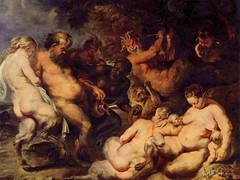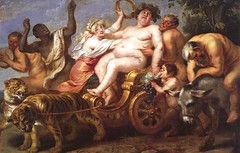Today is the feast of the Roman god Bacchus, known by the Greeks as the Greek god Dionysus. In my hometown Sint Niklaas, there used to be a bar called Bacchus. That was in the late seventies and early eighties.
I had to wait until the 1990s and the first issue of Wired Magazine to be properly introduced to Bacchus via Camille Paglia’s interview on her recently published Sexual Personae in which Paglia mentions the Nietzschean dichotomy of Apollonian and Dionysian.
- Popular perceptions of Dionysus and Bacchus
Dionysus was seen as the god of everything uncivilized, of the innate wildness of humanity that the Athenians had tried to control. The Dionysia was probably a time to let out their inhibitions through highly emotional tragedies or irreverent comedies. During the pompe there was also an element of role-reversal – lower-class citizens could mock and jeer the upper classes, or women could insult their male relatives. This was known as aischrologia – αἰσχρολογία or tothasmos, a concept also found in the Eleusinian Mysteries.
Bacchus is less wel documented in text, but all the better in painting (Leonardo, Michelangelo, and Caravaggio). His name is connected with bacchanalia, a term in moderate usage today to indicate any drunken feast; drunken revels; as well as binges and orgies, whether literally or figuratively.
Rubens
Bacchanalia
The bacchanalia were wild and mystic festivals of the Roman and Greek god Bacchus. Introduced into Rome from lower Italy by way of Etruria (c. 200 BC), the bacchanalia were originally held in secret and only attended by women.
The festivals occurred on three days of the year in a grove near the Aventine Hill, on March 16 and March 17. Later, admission to the rites was extended to men and celebrations took place five times a month. According to Livy, the extension happened in an era when the leader of the Bacchus cult was Paculla Annia.
Cornelis de Vos
Paculla Annia
Paculla Annia was a priestess from the southern Italy who, according to Livy, largely changed the rules of Bacchanalias so that regarding nothing as impious or forbidden became the very sum of Bacchus‘ cult. In the rites, men were said to have shrieked out prophecies in an altered state of consciousness with frenzied bodily convulsions. Women, dressed as Bacchantes, with hair dishevelled, would run down to the Tiber with burning torches, plunge them into the water, and take them out again. The rites gradually turned into sexual orgies, particularly among the men, and men who refused to take part were sacrificed. It is said these men were fastened to a machine and taken to hidden caves, where it was claimed they were kidnapped by the gods.
Prohibition by the Roman Senate
The festivities were reported to the Roman Senate which authorized a full investigation. In 186 BC, the Senate passed a strict law (the Senatus consultum de Bacchanalibus) prohibiting the Bacchanalia except under specific circumstances which required the approval of the Senate. Violators were to be executed.




